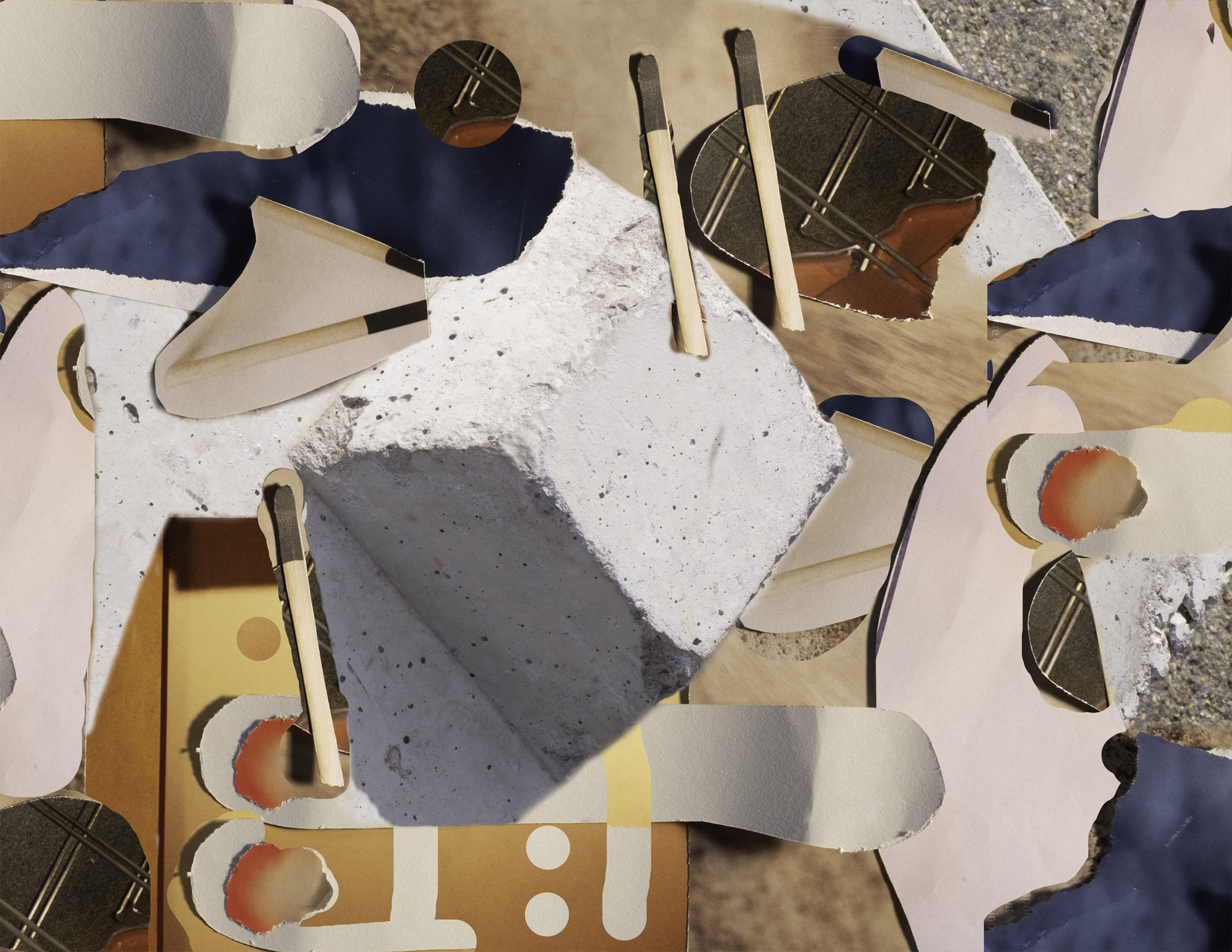
“To love is to tremble,” Luciana said.
“Then the earth loves us too much,” I replied, the sky turning gray and narrowing and sucking up all the light.
Lava ignited the ocean.
Thus I began measuring time according to Luciana’s pulse.“This is what it means to live among volcanoes,” she said, letting me listen to her lamb heart. “This is what it means to breathe in the mouth of death.”
To love and die.To step over cracks in crumbling bridges.
There was a time when the ground didn’t move. Then came the mother quake, and Luciana opened her legs engulfed in my shadow. There were many before, but none like this one: the apocalyptic one, the one that made us disappear into the planet burning like my sister’s tongue on my pelvis.
We played a game of picking out the differences between her name and mine.
Lu-ci-a-na
Lu-cre-ci-aWe interlaced our fingers in the semidarkness to cultivate a memory of the liquid fire that was our flesh.
We took refuge among the condors.
We hid from the blood of those who roamed dodging horses.
Luciana was afraid of the roofless darkness, that’s why she used her braids to measure the height of our walls. The house could’ve fallen, coming down with the hoarse, rocky sound of the earth, but she said that dying crushed inside your home was better than surviving without a shelter; that dying with our blood indistinguishable, red like the moon, mixed up in the foundation was poetic.
“Have you seen how battered you are?” she said, caressing me with her knuckles.
Volcanic eruptions painted the sky a sickly yellow.
Greenish yellow.
Pus yellow.But our house was a rock where colors didn’t matter. The earthquake destroyed the city and populated it with deserted shoes and carrion. People abandoned their shelters, ran outside dodging the horses and condors, left their buildings, their houses, their caves, because they didn’t want to be crushed to death. “The sky is the only thing that cannot fall!” they screamed, clawing at the city in ruins.
They put up tents on the sidewalks.
The children and elderly were swallowed with a belch of dusty vapor.
“Fear makes us stupid,” I whispered to Luciana while making love amid the disaster.
“It’d be perfect to die right now,” she gasped.Her tongue was long as a rope I would’ve liked to jump.Her tongue was a rope tying me to every corner of the house that never fell.
“To love is to tremble,” Luciana uttered so that I’d feel her words. She wanted a perfect death, but our house was a temple jealously guarding the history of what doesn’t fall.
“This is what will kill us,” I told her one night. “This absurd resistance.”
People preferred the darkness, the lava, or the open legs of the earth to approaching a house that wouldn’t fall.
Outside, the screams were weaker than any of my moans.Luciana counted the cracks with her eyes closed and had nightmares with her ears open. The condors were the only breath of God’s crashing into the incessant flame of the volcanoes. We watched them clean up the bodies the earth didn’t manage to devour and held each other to keep warm.
There were bones bigger than Luciana’s legs. She opened them engulfed in my shadow and demanded I touch her in that forbidden place. “Walk on top of me like a sexless dead man,” she said and then asked: “Do you like the taste of blood?”
“I do. It tastes like language,” I replied.Outside, men and women distanced themselves from our house like from a hellhole. “Ñaña, my ñañita: please, close your legs engulfed in my shadow,” I implored in the evenings, but Luciana wanted me to throw her corpse into the stables where a horse would never trample the dead.
“I want to be like that dead body the wild horses of your brow wouldn’t trample,” I told her the night I jumped over her rope and emerged from bed like someone drowned.
The night I drenched the corridors caressing the walls and their cracks.
The night I learned that swallowing ash was better than taking shelter in a hellhole.
Before jumping her rope and emerging from bed like someone drowned, I said: “It’s better to be food for condors than to live in this hellhole.”
Her insides dug my grave like a fire under the water.
“The perfect death doesn’t exist, there’s only death,” she told me, crying from beauty.
And I went outside so the sky would fall on me. ![]()
Mónica Ojeda was born in Ecuador and is the author of the novels La desfiguración Silva (Premio Alba Narrativa, 2014), Nefando (Candaya, 2016), and Mandíbula (Candaya, 2018), as well as the poetry collections El ciclo de las piedras (Rastro de la Iguana, 2015) and Historia de la leche (Candaya, 2020). Her stories have been published in the anthology Emergencias: Doce cuentos iberoamericanos (Candaya, 2014) and the collections Caninos (Editorial Turbina, 2017) and Las voladoras (Páginas de Espuma, 2020). In 2017, she was included on the Bógota39 list of the best thirty-nine Latin American writers under forty, and in 2019, she received the Prince Claus Next Generation Award in honor of her outstanding literary achievements.
Sarah Booker is a doctoral candidate at the University of North Carolina at Chapel Hill with a focus on contemporary Latin American narrative and translation studies. She is a literary translator working from Spanish to English and has translated, among others, Cristina Rivera Garza’s The Iliac Crest (Feminist Press, 2017; And Other Stories, 2018), Grieving: Dispatches from a Wounded Country (Feminist Press, 2020), and New and Selected Stories (Dorothy, 2022), as well as Mónica Ojeda’s Jawbone (Coffee House Press, 2021). Her translations have also appeared in such journals as the Paris Review, Asymptote, Latin American Literature Today, 3:AM Magazine, Nashville Review, MAKE, and Translation Review.
Collage: Ibrahim Azab
